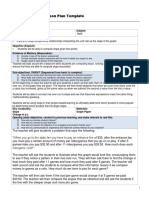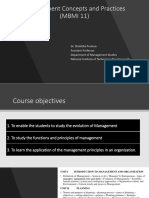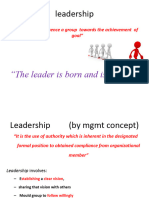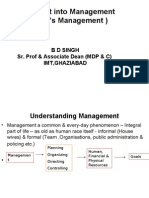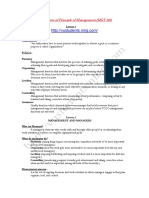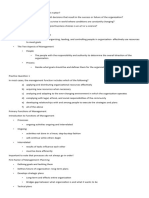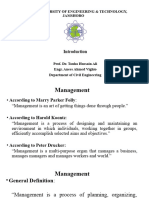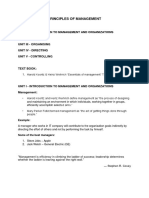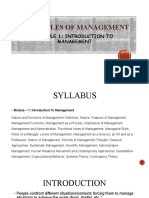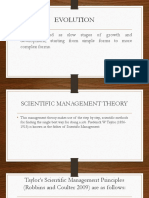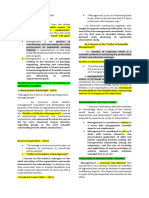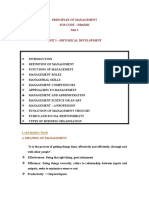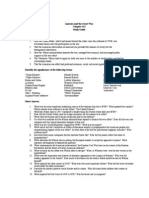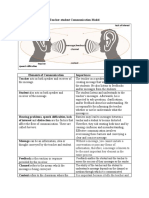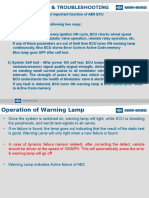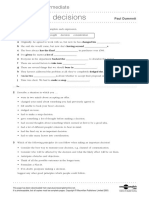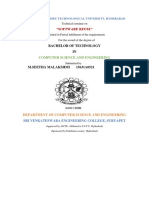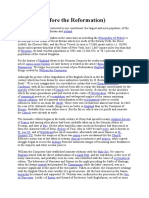0 ratings0% found this document useful (0 votes)
57 viewsIntroduction To Engineering Management pdf1
Introduction To Engineering Management pdf1
Uploaded by
Charles Kevin JaraulaThis document provides an introduction to management. It defines management as the process of getting activities completed efficiently and effectively through other people. It also discusses management as coordinating people to accomplish goals using available resources. The document then compares managers to orchestra conductors and notes that management involves both art and science. It briefly outlines the history of management and discusses the roles and responsibilities of engineering managers.
Copyright:
© All Rights Reserved
Available Formats
Download as PDF, TXT or read online from Scribd
Introduction To Engineering Management pdf1
Introduction To Engineering Management pdf1
Uploaded by
Charles Kevin Jaraula0 ratings0% found this document useful (0 votes)
57 views13 pagesThis document provides an introduction to management. It defines management as the process of getting activities completed efficiently and effectively through other people. It also discusses management as coordinating people to accomplish goals using available resources. The document then compares managers to orchestra conductors and notes that management involves both art and science. It briefly outlines the history of management and discusses the roles and responsibilities of engineering managers.
Original Title
Introduction to Engineering Management pdf1
Copyright
© © All Rights Reserved
Available Formats
PDF, TXT or read online from Scribd
Share this document
Did you find this document useful?
Is this content inappropriate?
This document provides an introduction to management. It defines management as the process of getting activities completed efficiently and effectively through other people. It also discusses management as coordinating people to accomplish goals using available resources. The document then compares managers to orchestra conductors and notes that management involves both art and science. It briefly outlines the history of management and discusses the roles and responsibilities of engineering managers.
Copyright:
© All Rights Reserved
Available Formats
Download as PDF, TXT or read online from Scribd
Download as pdf or txt
0 ratings0% found this document useful (0 votes)
57 views13 pagesIntroduction To Engineering Management pdf1
Introduction To Engineering Management pdf1
Uploaded by
Charles Kevin JaraulaThis document provides an introduction to management. It defines management as the process of getting activities completed efficiently and effectively through other people. It also discusses management as coordinating people to accomplish goals using available resources. The document then compares managers to orchestra conductors and notes that management involves both art and science. It briefly outlines the history of management and discusses the roles and responsibilities of engineering managers.
Copyright:
© All Rights Reserved
Available Formats
Download as PDF, TXT or read online from Scribd
Download as pdf or txt
You are on page 1of 13
Introduction to Management
What is management?
• Some Definitions
• Management is the process of getting activities completed efficiently and
effectively with and through other people. (Gulick & Urwick 1937)
• Management in all business and organizational activities is the act of getting
people together to accomplish desired goals and objectives using available
resources efficiently and effectively. (en.wikipedia.org)
• "Management is the art of getting things done through people.”
---- Mary Parker Follet
• “Management is the use of techniques based on measures artfully applied to
handle people (unpredictable) and to accomplish tasks (predictable).
-----Fraidoon Mazda
A manager is likened to an
Orchestra Conductor
• Who coordinates and manages the team’s
activities like an orchestra
• Able to analyze minute details, their
interrelationship and put them together
into one whole; (i.e,. specific trees vs. the
entire forest)
Management
• Both an art and a science
• No golden rules (No “rights” or “wrongs”) –
• Not an exact science, like engineering
• Learning the basic principles and techniques of
management in ES 92 – ‘language’ or ‘tools’ of
management and to be able to apply them to real life
situations later
• Being guided by experience which is the best teacher,
bearing in mind that management requires a constant
reappraisal of all that has been learned, since it is
almost certain that changes will occur over time
• Not to be a leader who issues commands and have
subordinates follow without question
Brief History
Engineering management Earlier organizations were
of pyramids of Egypt primarily family businesses.
First business school was Management theory was first
founded at the University popularized in the USA and
of Philadelphia (1881). spread slowly to Europe.
The growth of large
corporations in the 1950’s,
Management associations like
particularly multinationals,
AMA (American Management
provided a boost to the
Association) in 1923 and
British Institute of Management professional manager.
in 1948 were founded.
Engineering Manager
• Interfaces with a wide variety of functions
(finance, manufacturing, marketing, etc.)
• Needs to manage people (subordinates
reporting to him, peers, suppliers,
customers)
• Complex work tasks (includes preparation
of project plans and budgets)
.
Technical Background
• Cannot be filled by non-technical people (i.e.,
accounting and marketing people)
• Promotion from engineer to manager often a
reward for good engineering work;
• But a good engineer does not always make a
good manager; To be a good manager, one
must have good interpersonal skills and
common sense;
• Must learn to work through people rather than
doing the tasks themselves
• Often a middle manager who receives goals
from above and translates them to strategy and
plan of action
- the higher up the organization, the more the
awareness for other issues (i.e., financial,
people, etc.) and less with detailed technical
matters
- the lower in the organization, the emphasis is
technical details
Time Factor
• Job requires time for reflection and thought for
strategy and plan formulation
• But in practice, an open door policy which invite
interruptions; thus, must have the ability to shift
from one task to the next and from one person to
another
• Does not have the luxury of time (rarely a job
continuously worked)
People Factor
• People problems most difficult to tackle;
note that technical staff are highly
educated (independent individuals who do
not like to be told what to do all the time)
• To command and lead by negotiation at all
levels; this requires good interpersonal
skills
• Delegate technical tasks even if they feel they
can do it better; only by delegation that staff can
develop
• Reviews and discussions not limited to tasks;
includes personal issues and development of
subordinates
• Sensitive to peers – should not bypass other
managers (an an engineer, can talk directly to
an engineer in another department but cannot
do that as a manager without knowledge of the
manager in that department
Types of Manager
Managers vary in:
• Age
• Physical aspects
• Skills, experience and credentials
• Behavior
In looking for types of manager, managements styles are
considered.
You might also like
- Direct Instruction Lesson Plan Template 1Document4 pagesDirect Instruction Lesson Plan Template 1api-436028430No ratings yet
- Woven Heaven, Tangled Earth A Weaver's Paradigm of The Mesoamerican CosmosDocument36 pagesWoven Heaven, Tangled Earth A Weaver's Paradigm of The Mesoamerican CosmosNayeli Gutiérrez HernándezNo ratings yet
- Introduction To Engineering ManagementDocument52 pagesIntroduction To Engineering ManagementJoshua Roberto GrutaNo ratings yet
- An International Perspective: Weihrich and KoontzDocument79 pagesAn International Perspective: Weihrich and KoontzBaala Varunesh ElangovanNo ratings yet
- Introduction To Management and OrganizationsDocument44 pagesIntroduction To Management and OrganizationshashmizZNo ratings yet
- ENGMANDocument48 pagesENGMANAljun EstebanNo ratings yet
- Engineering Management Lecture 1Document49 pagesEngineering Management Lecture 1Jibril BuragaNo ratings yet
- Concept of ManagementDocument82 pagesConcept of Managementimmortal avinash80% (5)
- HSS - For End SemDocument467 pagesHSS - For End SemRadha Krishna YadavNo ratings yet
- Module 1 - HUT 310 - Ktunotes - inDocument140 pagesModule 1 - HUT 310 - Ktunotes - inhcqekktvbavytccxdxNo ratings yet
- Part 1 - Intro To Engineering ManagementDocument44 pagesPart 1 - Intro To Engineering ManagementShane Potpot Malana100% (1)
- Principles of Management - BCTDocument11 pagesPrinciples of Management - BCTrcharle18No ratings yet
- CM MPSCDocument47 pagesCM MPSCPravin IngoleNo ratings yet
- KMBN101 - Unit 1 SlidenotesDocument86 pagesKMBN101 - Unit 1 SlidenotesshubhamNo ratings yet
- Introduction To Engineering Management: April 2020Document51 pagesIntroduction To Engineering Management: April 2020JoshuaNo ratings yet
- MG 2351 Principles of ManagementDocument75 pagesMG 2351 Principles of Managementmurjass85No ratings yet
- Lecture 1 Introduction-Merged 240712 054411Document147 pagesLecture 1 Introduction-Merged 240712 054411qwekhusenna8No ratings yet
- ME 200 Introduction Module 1Document4 pagesME 200 Introduction Module 1Renz Errol HiposNo ratings yet
- MCP Unit 1Document62 pagesMCP Unit 1navyachawla57No ratings yet
- Unit - 1lecture No 4-6Document70 pagesUnit - 1lecture No 4-6nitinNo ratings yet
- POM NotesDocument75 pagesPOM NotesINDIA TECHNo ratings yet
- Management IntroductionDocument41 pagesManagement IntroductionRagnar LothbrokNo ratings yet
- Management IntroductionDocument41 pagesManagement IntroductionRagnar LothbrokNo ratings yet
- Non Profit (Ngo) Governance: Ujala Siddiq, PH.D ScholarDocument35 pagesNon Profit (Ngo) Governance: Ujala Siddiq, PH.D ScholarAlamgirNo ratings yet
- Peter Drucker'S Legacy: "The Man Who Redefined Management"Document4 pagesPeter Drucker'S Legacy: "The Man Who Redefined Management"Ketki PuranikNo ratings yet
- An Insight Into ManagementDocument37 pagesAn Insight Into Managementapi-3793009No ratings yet
- Short Notes of Principle of Management (MGT 301) : Lesson-1Document18 pagesShort Notes of Principle of Management (MGT 301) : Lesson-1asad ImranNo ratings yet
- Pom Unit 1Document140 pagesPom Unit 1Vetri VelanNo ratings yet
- Notes - Introduction To Engineering ManagementDocument12 pagesNotes - Introduction To Engineering ManagementKarl John CelajesNo ratings yet
- Lesson 2 A Educ Admin ManagementDocument32 pagesLesson 2 A Educ Admin Managementlesliemwangi2No ratings yet
- Art or ScienceDocument13 pagesArt or ScienceSrinivas PolikepatiNo ratings yet
- MODULE1MGTDocument61 pagesMODULE1MGTmahindedhia7No ratings yet
- BA 101 Management BasicsDocument4 pagesBA 101 Management BasicsHelena FloresNo ratings yet
- ManagementDocument9 pagesManagementNie TofuNo ratings yet
- POM All 5 UnitsDocument429 pagesPOM All 5 UnitsAnjuNo ratings yet
- Management: Author: Richard L. Daft Instructor: Luong Thu HaDocument119 pagesManagement: Author: Richard L. Daft Instructor: Luong Thu HaNguyễn Quang AnhNo ratings yet
- Chapter 1 Introduction To ManagementDocument47 pagesChapter 1 Introduction To Managementshrijan karkiNo ratings yet
- MTP - Chapter 02 DR GebreDocument86 pagesMTP - Chapter 02 DR GebretemeNo ratings yet
- From Technologist TO Management: - A Progessive JourneyDocument22 pagesFrom Technologist TO Management: - A Progessive JourneyMaazNo ratings yet
- IntroductionDocument13 pagesIntroductionABDUL ALEEMNo ratings yet
- POMDocument29 pagesPOMKeerthiraajanRameshNo ratings yet
- Unit 1Document70 pagesUnit 1Nitish GuptaNo ratings yet
- Principles of ManagementDocument146 pagesPrinciples of ManagementAnkan PaulNo ratings yet
- PoM Module1 Part1Document28 pagesPoM Module1 Part1developeramit4uNo ratings yet
- Definition of ManagementDocument22 pagesDefinition of ManagementArun. M-4006No ratings yet
- IV. Management Yesterday, Today, Tomorrow (Web)Document14 pagesIV. Management Yesterday, Today, Tomorrow (Web)Amadou KantehNo ratings yet
- Unit - 1 Principles NotesDocument65 pagesUnit - 1 Principles NotesLionel Bharath RazerNo ratings yet
- CM Chapter 1Document56 pagesCM Chapter 1Derara ambeseNo ratings yet
- Leadership Skills For Engineering Manage PDFDocument22 pagesLeadership Skills For Engineering Manage PDFperelapelNo ratings yet
- Business ManagementDocument27 pagesBusiness Managementrishu jainNo ratings yet
- Principles of Management BSCDocument119 pagesPrinciples of Management BSCVaishnavi ShivshankarNo ratings yet
- Reference Text: "Essentials of Management - A Global Perspective" Course Facilitator: Bijoy S GuhaDocument100 pagesReference Text: "Essentials of Management - A Global Perspective" Course Facilitator: Bijoy S GuhaHridesh_Tiwari_7919No ratings yet
- Evolution of ManagementDocument19 pagesEvolution of ManagementJhong Floreta MontefalconNo ratings yet
- Orgman ReviewerDocument8 pagesOrgman ReviewerElla Mae MabiniNo ratings yet
- Module - 01 NotesDocument52 pagesModule - 01 NotesMohan KumarNo ratings yet
- Module 1 - HUT 310Document139 pagesModule 1 - HUT 310afsanashah2000No ratings yet
- Principles and Practices of ManagementDocument82 pagesPrinciples and Practices of Managementsandeep.kumar-1No ratings yet
- Pom - Unit IDocument25 pagesPom - Unit Isathya.govindarajan8291No ratings yet
- Chapter IDocument21 pagesChapter IVinod GhadgeNo ratings yet
- 1 MGT Concepts and Practices (2014 E.C)Document56 pages1 MGT Concepts and Practices (2014 E.C)TEWODROS ASFAWNo ratings yet
- Management Principles: An introduction to the fundamental concepts and theories of management: Administration: The science of managing resourcesFrom EverandManagement Principles: An introduction to the fundamental concepts and theories of management: Administration: The science of managing resourcesNo ratings yet
- Leaders Become Leadership | Los Líderes Se Convierten En Liderazgo: You Better Stand Your Watch | Es Mejor Que Sostengas Tu RelojFrom EverandLeaders Become Leadership | Los Líderes Se Convierten En Liderazgo: You Better Stand Your Watch | Es Mejor Que Sostengas Tu RelojNo ratings yet
- Will All Christians Be Equally Happy in HeavenDocument3 pagesWill All Christians Be Equally Happy in HeavenademuwagunNo ratings yet
- Prayer (Pagsamo) : Form 1-Scc A.M. NO. 08-8-7-SC Page (Pahina) 7Document4 pagesPrayer (Pagsamo) : Form 1-Scc A.M. NO. 08-8-7-SC Page (Pahina) 7Lucille ArianneNo ratings yet
- Certificate of PromotionDocument12 pagesCertificate of PromotionRona Pineda LozadaNo ratings yet
- Mr. Sunil Kumar - Offer Letter and CTC BreakupDocument2 pagesMr. Sunil Kumar - Offer Letter and CTC BreakupSaraswati ChandraNo ratings yet
- SPMLDocument12 pagesSPMLram babuNo ratings yet
- ParallelismDocument2 pagesParallelismTuanda TVsNo ratings yet
- Los Precursores de Aromas Específicos de Cacao Se Generan Mediante Digestión Proteolítica de La Vicilina Como Globulina de Semillas de CacaoDocument35 pagesLos Precursores de Aromas Específicos de Cacao Se Generan Mediante Digestión Proteolítica de La Vicilina Como Globulina de Semillas de CacaoJulio Cesar Torres PereyraNo ratings yet
- Training Industry Report 2016Document15 pagesTraining Industry Report 2016AsthaNo ratings yet
- Developmental MilestonesDocument9 pagesDevelopmental MilestonesRiccardo Mason TroiaNo ratings yet
- Smart Phone Addiction and Family Interaction of Grade 12 Set-F Humss StudentsDocument13 pagesSmart Phone Addiction and Family Interaction of Grade 12 Set-F Humss StudentsJay BuenacosaNo ratings yet
- Monster Inc.Document36 pagesMonster Inc.SamSanch.No ratings yet
- Rhetoricians in Roman TimesDocument16 pagesRhetoricians in Roman Timesapi-271174510No ratings yet
- Group 1: 1. Adilian Nur Oktasari 2. Lidya Joanda PutriDocument15 pagesGroup 1: 1. Adilian Nur Oktasari 2. Lidya Joanda PutriMuharam sanitarianNo ratings yet
- CH 23Document1 pageCH 23Maddy RendekNo ratings yet
- Eric The Red: The Saga of Erik The Red Tells That at A Young Age, Erik's Father Was Banished From Norway. TheyDocument2 pagesEric The Red: The Saga of Erik The Red Tells That at A Young Age, Erik's Father Was Banished From Norway. TheygrescaNo ratings yet
- Edited Copy Christian Youth Const.Document26 pagesEdited Copy Christian Youth Const.IGGA ELIANo ratings yet
- Teacher-Student Communication ModelDocument2 pagesTeacher-Student Communication ModelKimberly Jane A. BalansagNo ratings yet
- ABS DiagnosticsDocument11 pagesABS DiagnosticsRaghu NaathNo ratings yet
- Guide To Mass EvidenceDocument229 pagesGuide To Mass EvidenceErik C BryanNo ratings yet
- Five Sheaths or Koshas in YogaDocument5 pagesFive Sheaths or Koshas in Yogabroxie100% (1)
- 104 PDFDocument1 page104 PDFkevinNo ratings yet
- How To Learn A New Language QuicklyDocument59 pagesHow To Learn A New Language Quicklysamkamal01100% (2)
- Bachelor of Technology IN: Computer Science and EngineeringDocument4 pagesBachelor of Technology IN: Computer Science and EngineeringSanda MounikaNo ratings yet
- In The Republic of South AfricaDocument25 pagesIn The Republic of South AfricashNo ratings yet
- Engleska 1066-1558Document27 pagesEngleska 1066-1558Historica VariaNo ratings yet
- 1 Problem Statement: Title of The Mini ProjectDocument12 pages1 Problem Statement: Title of The Mini Projectprateek khotNo ratings yet
- Course Expectations - Learners V2 (57508)Document3 pagesCourse Expectations - Learners V2 (57508)harjinder kaurNo ratings yet
- FP Consultative Meeting September 27 2023Document38 pagesFP Consultative Meeting September 27 2023Merceditas MontillaNo ratings yet
